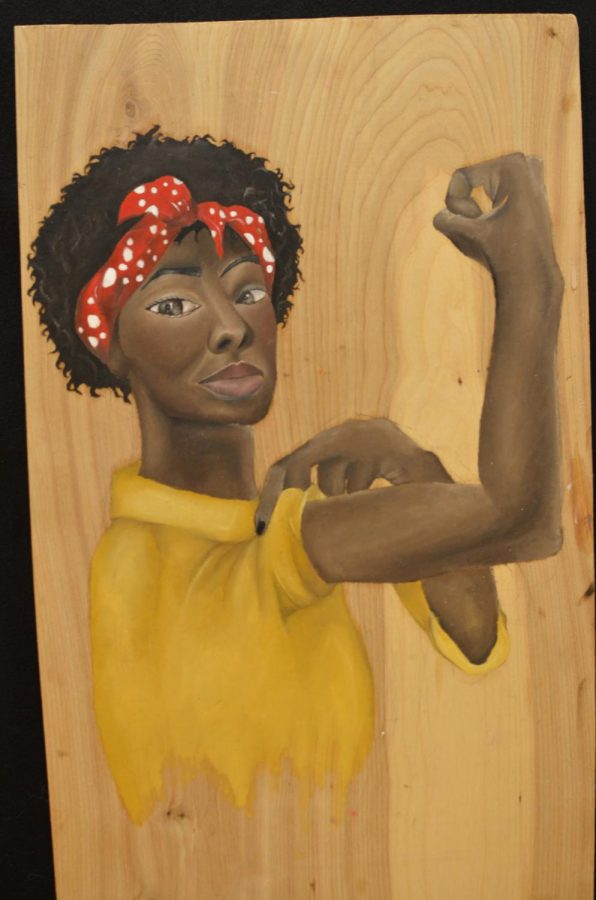West Honors MLK at Annual Assembly
Jan 18, 2018
On the morning of Wed., Jan. 17, Niles West students and staff came together to celebrate the life and legacy of Rev. Dr. Martin Luther King Jr. through the annual MLK Day Assembly. The assembly was organized by West’s Black Student Union (BSU) and featured performances by West’s Symphonic Orchestra, Gospel Choir, Master Choir, and Orchesis.
The assembly opened with the choir’s rendition of the song “Lift Every Voice and Sing,” which emerged as the “Black National Anthem” in 1919. Originally a poem, “Lift Every Voice and Sing” is a song of hope that reflects on a history of hardship and slavery and calls on African-Americans to continue to move forward. The audience was silent while the choir sang, and members of BSU slowly took the stage, displaying signs that read “Unity,” the theme of this year’s assembly, in several languages.
Opening remarks were made by BSU student leaders and seniors Kayla Lawrence and Kayla Scott. Then, two members of West’s slam poetry team, A Tribe Called West, took the stage to perform a spoken word piece — senior Sarah Montes and sophomore Penelope Alegra performed an original piece, “Ropas Viejas,” entirely in Spanish.
Senior and BSU member Simone Perrin then delivered a speech urging students to heed the legacy of Martin Luther King Jr. and promote unity, both at West and in the world around us.
“My goal when writing this speech was to make sure I wrote something that people could relate to,” Perrin said. “Since unity was the theme, I made sure to stress to the students that we are all in this world together, so we should be standing united, working alongside one another to create a better society.”
District 219 Director of Equity La Wanna Wells delivered the keynote speech for the assembly. She reminded students of last year’s theme, “self-advocacy,” and explained the significance of the theme of “unity,” noting the difference between the two. Wells went on to discuss the necessity of confronting our differences no matter how uncomfortable it may be, as well as the importance of raising others up at the same time we advocate for our own well-being. She ended her remarks by leading the audience in a short pledge: “I will do my best to understand more and judge less.”
Wells invited students to continue discussions of race in the Student Commons, and she challenged students to connect with a person of a different race sitting near them and share what they learned on a Google form.
“I wish to reiterate the importance of today’s theme of unity by reminding you that the purpose of my asking you to take a risk and to exchange contact information from a fellow student or a co-worker of another race is to understand new perspectives and to appreciate the person who has them because there is no divider bigger in our nation than race,” Wells said in an email sent out later in the day. “It is important that we all come together regardless of race, political affiliation, sexual orientation, religion or class, for we are a group of pioneers and winners. Never give up on yourself and support others.”
Orchestra Director Dajuan Brooks introducing the final portion of the assembly, which included two musical performances. The first piece, composer Eric Whitacre’s “October,” was performed by the Symphonic Orchestra. The sentimental piece was accompanied by artwork from West’s visual arts students that centered on themes of race, inequality, and the beauty of our differences.
The second and final piece was a collaborative performance that brought together the orchestra, choir, and members of Orchesis. The piece was a rendition of Beyoncé’s “Freedom,” and many students agree that it was both a powerful and beautiful way to end the day’s performances.
“The last piece was incredible,” sophomore Aiman Saleem said. “All of the different groups ended up coming together to convey a really powerful message about freedom and unity.”
Senior Sihah Reza, who performed with the orchestra at the assembly, had a similar perspective on the final song.
“‘Freedom’ has a really powerful video with Beyoncé performing, and it really embodies the nature of black resistance that happened during the Civil Rights movement,” she said. “I think the song is so influential because music has always really had the power to move people.”




